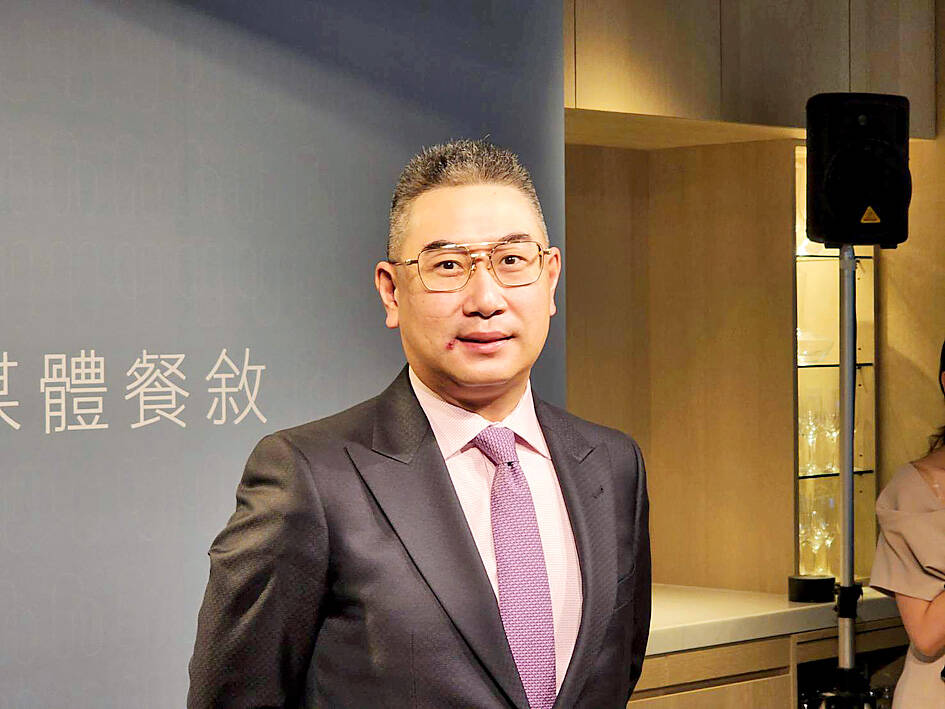Two major local hotel chains yesterday said that they are looking at further revenue improvement this quarter and beyond on the back of demand from international business travelers, meetings and exhibitions.
Wilhelm Tsai (蔡伯翰), chairman of luxury hotel operator My Humble House Hospitality Management Consulting Co (寒舍餐旅), told an annual shareholders’ meeting that occupancy rates recovered to 70 percent in the first quarter, while daily room rates stood at NT$6,500 (US$212), lifting revenue by 47.31 percent year-on-year to NT$1.2 billion, higher than the level before the COVID-19 pandemic.
First-quarter net income was NT$82 million, or earnings per share of NT$0.90, the second consecutive quarter of profit and a big jump from a year earlier, company data showed.

Photo: Wang Yi-hung, Taipei Times
Tsai attributed the impressive showing to the return of international business travelers, the main target clientele for its urban properties, after Taiwan ended border controls in October last year.
Occupancy rates at Le Meridien Taipei (台北寒舍艾美酒店) in the Xinyi District (信義) hit 80 percent last month and this month, and room rates climbed to NT$,9500, Tsai said, adding that the property and adjoining Humble House Taipei (寒舍艾麗) are also benefitting from the ongoing Computex trade show.
The event helped boost food and beverage sales, and business momentum would sustain, aided by the Dragon Boat Festival next month and healthcare conferences in July, Tsai said.
The group, which also operates Sheraton Grand Taipei Hotel (台北喜來登大飯店) near Taipei Railway Station, Humble Boutique Hotel (寒居酒店) in Taipei’s Zhongshan District (中山) and hot spring resort Mu Jiaosi Hotel (礁溪寒沐) in Yilan County, is collaborating with foreign travel agencies and other sales channels to help woo foreign tourists, he said.
Similarly, FDC International Hotels Corp (雲品國際) told its shareholders it has recovered from the COVID-19 pandemic and would put up a stronger financial performance.
FDC has signed 10 management contracts, with seven already in operation and three more to start, in line with the company’s attempt to diversify its income sources, it said.
The strategy would grow its economic scale and provide synergy in terms of cross-selling efficiency, revenue expansion and cost controls, it said.

Semiconductor business between Taiwan and the US is a “win-win” model for both sides given the high level of complementarity, the government said yesterday responding to tariff threats from US President Donald Trump. Home to the world’s largest contract chipmaker, Taiwan Semiconductor Manufacturing Co (TSMC, 台積電), Taiwan is a key link in the global technology supply chain for companies such as Apple Inc and Nvidia Corp. Trump said on Monday he plans to impose tariffs on imported chips, pharmaceuticals and steel in an effort to get the producers to make them in the US. “Taiwan and the US semiconductor and other technology industries

CHIP WAR: Tariffs on Taiwanese chips would prompt companies to move their factories, but not necessarily to the US, unleashing a ‘global cross-sector tariff war’ US President Donald Trump would “shoot himself in the foot” if he follows through on his recent pledge to impose higher tariffs on Taiwanese and other foreign semiconductors entering the US, analysts said. Trump’s plans to raise tariffs on chips manufactured in Taiwan to as high as 100 percent would backfire, macroeconomist Henry Wu (吳嘉隆) said. He would “shoot himself in the foot,” Wu said on Saturday, as such economic measures would lead Taiwanese chip suppliers to pass on additional costs to their US clients and consumers, and ultimately cause another wave of inflation. Trump has claimed that Taiwan took up to

A start-up in Mexico is trying to help get a handle on one coastal city’s plastic waste problem by converting it into gasoline, diesel and other fuels. With less than 10 percent of the world’s plastics being recycled, Petgas’ idea is that rather than letting discarded plastic become waste, it can become productive again as fuel. Petgas developed a machine in the port city of Boca del Rio that uses pyrolysis, a thermodynamic process that heats plastics in the absence of oxygen, breaking it down to produce gasoline, diesel, kerosene, paraffin and coke. Petgas chief technology officer Carlos Parraguirre Diaz said that in

Japan intends to closely monitor the impact on its currency of US President Donald Trump’s new tariffs and is worried about the international fallout from the trade imposts, Japanese Minister of Finance Katsunobu Kato said. “We need to carefully see how the exchange rate and other factors will be affected and what form US monetary policy will take in the future,” Kato said yesterday in an interview with Fuji Television. Japan is very concerned about how the tariffs might impact the global economy, he added. Kato spoke as nations and firms brace for potential repercussions after Trump unleashed the first salvo of